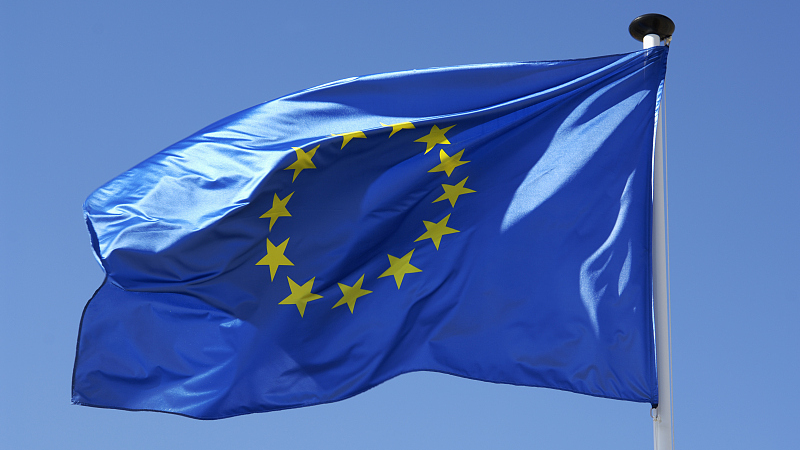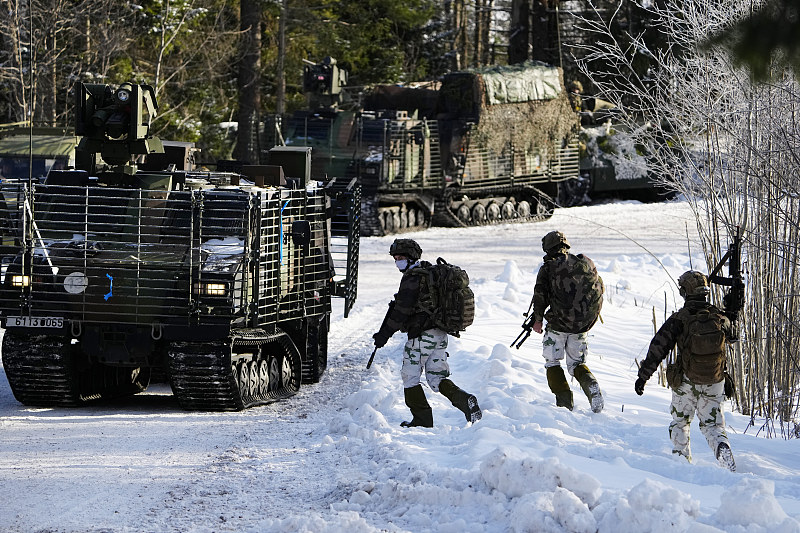
Editor's note: Dong Yifan, a special commentator for CGTN, is a research fellow with the Institute of European Studies, China Institutes of Contemporary International Relations. The article reflects the author's opinions and not necessarily the views of CGTN.
On August 28-29, the European Union (EU) is holding an informal meeting of defense ministers in Spain, which holds the rotating presidency in the second half of the year. It is expected that dealing with the Ukraine crisis will remain its core topic, but maintaining European security and building the bloc's independent defense capabilities are also important topics of discussion. Coincidentally, French President Emmanuel Macron stated at the 54th Paris Air Show held in June that the EU should develop its independent military industrial system and reduce its dependence on the U.S. for security and defense. It can be seen that some people of insight in the EU still call for strengthening independent military capabilities in the context of the crisis, seeking to take European security in their own hands.
In fact, the resolution of the Ukraine crisis and the establishment of a European security structure are the key to the future development of the EU. At present, the development of these two elements is not under the control of the EU. The main reason is still that the EU lacks the ability to independently provide security guarantees and build a security framework. Therefore, the EU regards building its own defense capabilities and building a more balanced relationship with NATO as the key to developing its "strategic autonomy" and taking security into its own hands.
Strategic autonomy centered on defense autonomy has been an important pursuit of the EU in recent years, and it is also an important measure for it to seek an independent status on the international stage and better safeguard its own interests. In fact, the EU has also made a lot of efforts in recent years. For example, the "Permanent Structural Cooperation" (PESCO) mechanism has been continuously deepened and implemented. The European Council has designated 2022 as the "European Defense Year." The "Security and Defense Strategic Compass" document gradually emphasizes the importance of establishing the EU's common defense force and the integration of military forces. However, the outbreak of the Ukraine crisis has made the EU more dependent on the U.S. in the field of security than ever before, and the commitments of countries to strengthen their own defense are basically based on the NATO framework, making defense autonomy face huge resistance in terms of resource investment and political will.

French soldiers attend the Winter Camp 23 military drills in Estonia, February 5, 2023. /CFP
French soldiers attend the Winter Camp 23 military drills in Estonia, February 5, 2023. /CFP
In terms of political will, EU countries have highly divided opinions on building defense autonomy. France is the only country that strongly supports defense autonomy. Germany is extremely vacillating between its vision of strategic autonomy and its attachment to NATO. Central and Eastern European countries generally support the complete transfer of European security to the U.S. and NATO, and continue to strengthen the bilateral defense binding between their countries and the U.S. It can be seen from the recent defense procurement trends of European countries. For example, Germany spent huge sums of money to purchase American F-35 fighter jets and Israeli-made defense systems. Poland signed a $14.8 billion arms deal with South Korea in August 2022, while the core technology of many South Korean weapons comes from the U.S. From this point of view, many EU member states are unwilling to completely rely on the EU for security.
From the perspective of the development of the defense industry, the EU's defense autonomy depends on the joint production of technologically advanced and cost-effective weapons and equipment by European countries. However, the EU is facing increasingly huge challenges in this respect. The military industry is highly dependent on technology R&D investment and batch orders. Only when enterprises make huge investments can they improve the performance and technical level of weapons, competitiveness in the international market, and obtain future research and development funding through orders.
Therefore, major arms exporters can often rely on cost-effective advantages to continuously expand their competitiveness, and it is easier to gain customers. Therefore, France hopes to create a large enough market for European arms manufacturers and gather R&D resources by building a joint R&D and procurement framework at the EU level.
However, some EU member states tend to sell weapons and equipment to the U.S. and other countries in terms of large arms sales out of short-term considerations for improving weapons technology and relying on the geopolitical thinking of the U.S., which challenges the EU's vision of consolidating an independent industrial base for defense. In addition, the defense construction initiatives proposed by some countries are also regarded by France as a dismantling move.
Therefore, the EU's vision for self-defense development may not be optimistic. In the context of the deepening crisis in Ukraine, in the short term, most EU countries still hope to rely on the U.S. as their security guarantee, which intensifies the EU's all-round dependence on the U.S., and also makes its foreign and security policies continue to be influenced by the U.S. The goal of building strategic independence is also difficult to achieve. Therefore, as the EU continues to rely on the U.S. in the context of major changes, it may be difficult to guarantee its strategic independence in the Ukraine crisis and relations with China, which will also bring more uncertainties to global peace and stability.
(If you want to contribute and have specific expertise, please contact us at opinions@cgtn.com. Follow @thouse_opinions on Twitter to discover the latest commentaries in the CGTN Opinion Section.)